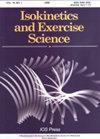Relationship between clinical outcome measurements and muscle thickness in cerebral palsy
IF 0.6
4区 医学
Q4 ENGINEERING, BIOMEDICAL
引用次数: 0
Abstract
BACKGROUND: The World Health Organization (WHO) uses the International Classification of Functioning, Disability, and Health (ICF) model to provide physical therapy diagnoses and interventions. However, the relationship between clinical assessment and imaging remains unclear. OBJECTIVE: This study aimed to determine the relationships between body function/structure, activity, and participation outcomes following neurorehabilitation in children with cerebral palsy (CP). METHODS: Nineteen children (9 girls mean age 8.8 ± 1.8 years) with CP participated in this study. Clinical motor function tests included the quality of upper extremity skills test (QUEST), Wolf motor function test (WMFT), Functional Independence Measure for Children (WeeFIM), and the Jebsen-Taylor Hand Function Test (JTHFT). Ultrasound imaging was used to measure muscle thickness, which characterizes the body structure, and activity domain variables. RESULTS: The correlations between body structure domain (muscle thickness), activity domain (QUEST, WMFT, WeeFIM) and participants variable (JTHFT) were significant, ranging from r=-0.484 to 0.893, P< 0.05. CONCLUSIONS: These novel findings suggest that muscle thickness ultrasound imaging is closely associated with WMFT, WeeFIM, and QUEST variables. This finding provides important clinical insights when using broad clinical assessment and imaging in children with CP.脑瘫患者的临床疗效测量与肌肉厚度的关系
背景:世界卫生组织(WHO)使用国际功能、残疾和健康分类(ICF)模型来提供物理治疗诊断和干预。然而,临床评估和影像学之间的关系尚不清楚。目的:本研究旨在确定脑瘫(CP)儿童神经康复后身体功能/结构、活动和参与结果之间的关系。方法:19例CP患儿(女孩9例,平均年龄8.8±1.8岁)参加本研究。临床运动功能测试包括上肢技能质量测验(QUEST)、Wolf运动功能测验(WMFT)、儿童功能独立性测验(WeeFIM)和捷成-泰勒手功能测验(JTHFT)。超声成像用于测量肌肉厚度,这是身体结构的特征,以及活动域变量。结果:身体结构域(肌肉厚度)、活动域(QUEST、WMFT、WeeFIM)和参与者变量(JTHFT)之间的相关性显著,r=-0.484 ~ 0.893, P< 0.05。结论:这些新发现表明,肌肉厚度超声成像与WMFT、WeeFIM和QUEST变量密切相关。这一发现为使用广泛的临床评估和影像学检查儿童CP提供了重要的临床见解。
本文章由计算机程序翻译,如有差异,请以英文原文为准。
求助全文
约1分钟内获得全文
求助全文
来源期刊

Isokinetics and Exercise Science
医学-工程:生物医学
CiteScore
1.20
自引率
14.30%
发文量
37
审稿时长
>12 weeks
期刊介绍:
Isokinetics and Exercise Science (IES) is an international journal devoted to the study of theoretical and applied aspects of human muscle performance. Since isokinetic dynamometry constitutes the major tool in this area, the journal takes a particular interest in exploring the considerable potential of this technology.
IES publishes studies associated with the methodology of muscle performance especially with respect to the issues of reproducibility and validity of testing, description of normal and pathological mechanical parameters which are derivable from muscle testing, applications in basic research topics such as motor learning paradigms and electromyography. The journal also publishes studies on applications in clinical settings and technical aspects of the various measurement systems employed in human muscle performance research.
The journal welcomes submissions in the form of research papers, reviews, case studies and technical reports from professionals in the fields of sports medicine, orthopaedic and neurological rehabilitation and exercise physiology.
 求助内容:
求助内容: 应助结果提醒方式:
应助结果提醒方式:


